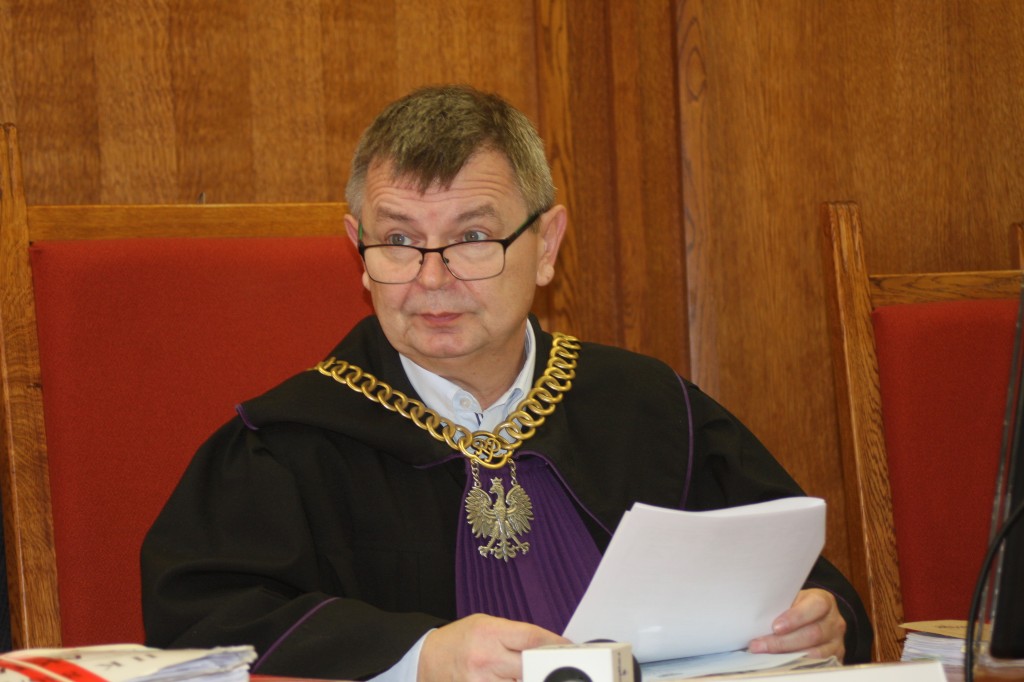-
Bohaterstwo, które podziwiał świat. „W..
POLSKA2 lata temu -
Neon24 – ruska V kolumna
POLSKA3 lata temu -
Nowe osoby w Zarządzie Amiblu
BIZNES3 lata temu -
Mechanizm warunkowości – krok ku Homo Eu..
POLSKA3 lata temu -
Wściekłe i wulgarne „Lemparcice” ..
POLSKA4 lata temu -
Rolnicze poparcie dla prezesa Elewarru – ..
NEWS4 lata temu
Dokumenty ang. w sprawie wyborów przekazane do OBWE

Nowy Ekran przekaże w piątek OBWE angielskie tłumaczenia dokumentów demaskujących zafałszowanie wyborów w Polsce przez PKW. Można kopiować i linkować do innych organizacji międzynarodowych.
(tłumaczenie: Mustrum)
Orzeczenie Sądu Najwyższego:
VERDICT
On this 31 day of August 2011 r.
The National Court, with:SSN Kazimierz Jaśkowski (chief magistrate, spokesperson)SSN Teresa Flemming-KuleszaSSN Józef lwuIskipresiding,in the case re. the complaint by the Electoral Committee of the Citizen Voters of the Electoral Lists of Nowy Ekran (New Monitor) against the decision by the National Electoral Commission dated August 23 2011 (No. ZPOW540-106/11) re. the refusal to admit the filing by the duly appointed representative of the registration of the Electoral Committee of Citizen Electors of the Electoral Lists of Nowy Ekran,and having deliberated in closed proceedings in the Chamber of Labour, Social Insurance and Public Affairs on August 31, 2011,sees the complaint as justified.
Rationale
The Electoral Committee of Citizen Electors of the Electoral Lists of Nowy Ekran (henceforth: "Electoral Committee") has lodged a complaint against a decision by the national Electoral Commission dated August 23, 2011 which had refused to admit the submission (made on August 22, 2011) of the formation of the Electoral Committee in the general elections to the Parliament and Senate of the Republic of Poland that have been set for October 9, 2011. The reason for the refusal was the failure to attach at least 1000 signatures of citizens with parliamentary electoral rights who support the formation of the Electoral Committee, which is a breach of Art. 204 § 7 Pt. 3 of the Act dated january 6, 2011, Electoral Law (JA No. 21, pos. 112 with changes). Although the notification included a list of 1082 signatures, only 945 of these were submitted correctly. There were 137 improper signatures, including 40 cases of incorrectly given names or surnames of supporting persons, in 56 cases their address was given incorrectly and in another 41 cases the PESEL (Social Insurance) number was wrong. The National Electoral Committee failed to call upon the duly appointed representative of the Electoral Committee to remedy this fault on the basis of Art. 97 § 2 of Electoral Law, because the deadline for submitting notices has passed, and its remediation was impossible.In the complaint against this decision, the duly appointed representative of the Electoral Committee, Paweł Pietkun, has made two assertions. The first concerned the breach of Art. 97 § 2 Electoral Law by the failure to call upon him to remedy the errors in the notice, despite the obligation to do so according to said rule. The second assertion concerned the qualification by the National Electoral Commission (NEC) of the signatures of presons supporting the formation of the Electoral Committee. It was asserted that in contravention of the rationale of said decision, the National Electoral Committee did not question the signatures of the citizens, but their personal data. Electoral Law does not specify the criteria to be used in determining the correctness of data contained in the lists of citizens supporting a committee, which dos not mean that they can be arbitrary and used irregularly. The verification of the data should be meticulous. The plaintiff has asserted that the NEC has not indicated why the data of some persons was questioned, but accessible files show that it was due to the illegibility of a number of entries. In the complaint this was refuted, and 57 entries were listed, which in the view of the plaintiff were legible and should have been admitted. Photocopies of the lists on which these entries were located were attached to the complaint. It is the view of the plaintiff that the character of some persons signing the list, as well as the ability of the NEC to decipher handwriting are incompatible. There is no requirement that personal data are to be written in block letters, and the handwriting of many persons, particularly the elderly, is often illegible. When verifying persons indicated in the list, the NEC should make use of the voter registry, as set out in Art. 18 Electoral Law. In response to the complaint , the National Electoral Committee has maintained their position as set out in the questioned decision. It maintains that the questioned notification of the formation of the Electoral Committee was made on August 22, 2011, on the date of the deadline for this activity, and the decision to refuse its admission was made on the following day. It referred to the National Court verdict of September 19, 2002 (III SW 28/02 ) where it is stated that the lack of the required number of signatures cannot be rectified after the passing of the deadline for their submission to the NEC. Therefore the plaintiff was not called upon to remedy the indicated errors on the basis of Art. 97 § 2 Electoral Law. In response to the second assertion, the NEC stated that it is not legally qualified to evaluate the causes of errors in indicated signatures. Illegible entry of supporters’ personal data makes it impossible to determine whether this person has been entered into the voter registry, and thus whether they are eligible to support [a committee]. As of August 5, 2011 the web page of the NEC hosted information relating to the formation of electoral committees, which included detailed information and templates of all documents necessary to form an electoral committee. Particular mention was made of the requirements that must be met by a correctly prepared list of signatures and the personal data of supporting persons. The plaintiff collected signatures o lists made according to the given template and thus it can be concluded that they possessed knowledge of these requirements. The National Electoral Committee moved for the dismissal of the complaint. The National Court sentences as follows.The complaint is justified. According to Art. 84 § 1 Electoral Law, committees possess the right to put forth candidates in an election. In Parliamentary elections, a notice of formation of an Electoral Committee submitted to the National Electoral Commission should include, amongst others, a list of at least 1000 signatures of citizens possessing the right to vote in the Parliamentary election who support the formation of said committee (Art. 204 § 6 E. Law), which encompasses their names, surnames, address of residence and social insurance number, as well as their own signature (Art. 204 § 7 Pt. 3 E. Law). The notice is submitted up to the 50th day before the election (Art. 204 § 6 E. Law). If the notice is erroneous, the National Electoral Committee calls upon the duly appointed representative within 3 days to remedy the errors within 5 days (Art. 97 § 2 E. Law).The first assertion in the complaint relating to the contravention of Art. 97 § 2 E. Law, is unfounded. National Court practice unequivocally states that the deadline for submitting the list of citizens supporting the formation of the electoral committee cannot be prolonged due to the duly appointed representative being called on to remedy missing information (see, in particular, the verdict by the extended panel of seven judges, dated September 19, 2002 L, III SW 28/02, OSNP 2003 No. 4, pos. 89 as well as that dated October 12, 2004 r., III SW 47/04, unpublished, as well as the decision of May 10 2004 L, III SW 4/04, unpublished). Thus, the plaintiffs were rightly not called upon to remedy the errors, because the notice was served on the last day of the deadline for its submission.The second assertion of the complaint is justified, however, which relates to the incorrect evaluation by the National Electoral Committee of data in the list of persons supporting the plaintiff Committee. It was rightly pointed out in the complaint that the data of 57 citizens in the list was erroneously classified as incorrect. As the NEC qualified 945 signatures as correct, the addition of 57 further ones means that the Committee met the requirement of attaching at least 1000 signatures of citizens who possess the rights to vote in the parliamentary election and who support its formation.From the attached photocopies of 39 list sheets, it stemmed that 55 entries were seen as incorrect by the NEC due to illegibility and 2 due to a failure to enter an address of residence, wherein the postal code was entered. In response to the complaint, the NEC has not responded to assertions by the plaintiff relating to individual entries. As to the illegibility of the entries, the plaintiff rightly put forth that this is largely a matter of the individual abilities of the person evaluating the lists. The National Court feels that in evaluating the legibility of entries, on should keep foremost in mind the goal and function of the list of citizens supporting the formation of the electoral committee. The submission of such a signature is an element of the civic right to elect representatives (Art. 62 of the Constitution). Because voters can only put forth candidates via electoral committees formed by them (Art. 84 § 1 Electoral Law), the signature is also an embodiment of the right of the voter to put forth candidates for members of parliament (Art. 100 Par. 1 of the Constitution). These citizens’ constitutional rights cannot be limited by an excessively restrictive method of evaluating the correctness of entries in the list of supporters of: the formation of an electoral committee, and in other cases, candidates for positions which by the power of the Constitution are filled via direct elections.The verification of the veracity of the personal data of a citizen who signed his name on the aforementioned list, occurs via its comparison to the data from the social insurance number submitted by the citizen. The SIN of each voter who is a Polish citizen, as well as remaining data (name, surname and address of residence) is found in the voter registry (Art. 18 § 7 Electoral Law). Thus, it is not necessary to enter personal data so clearly as to that without knowledge of data from the voter registry to unequivocally determine the name, surname and address of a person expressing support. The situation is different than the case when personal data is being read on the basis of a text handwritten by a voter. It is not a case of whether the person reading the handwritten entries recognizes solely on their basis the name, surname and address of the voter giving support, but so that that person can check whether there are no significant discrepancies between the data from the voter registry and those given in the list of support. The main goal of this evaluation of the data is to ascertain whether the person who signed the list of support is in reality a rightful voter whose SIN number is entered in the voter registry, and thus to limit the possibility of fraud. Thus, to achieve this goal, it is not necessary to require the full legibility of personal data submitted by a voter on the support list, but may limit the constitutional rights of a citizen who does not have legible handwriting. For this reason the National Court feels that in the evaluation of the correctness of personal data in a list of support, one should use a method opposite to that used by the NEC.Such an entry is erroneous when a given name, surname and address of residence unequivocally do not pertain to a voter designated by the SIN number on the support list. Such was not the case in 55 entries, which the plaintiff asserted were erroneously deemed incorrect by the NEC. The National Court deems them correct, like the 2 entries in which instead of the address only a postal code was given, which to a satisfactory degree serves as identification of the voter expressing their support. The National Court has previously spoken out against excessively rigorous evaluation of voters’ personal data. The view taken, in the verdict of August 9, 2004 (III SW 42/04 unpublished), is that the designation of persons in a list of support for the formation of an electoral committee requires the indication of a voter’s city of residence using a commonly used short form is no basis for the NEC to refuse the submission of the notice of formation of said committee.For these reasons, on the basis of Art. 205 § 2 Electoral Law, the verdict is as stated in the sentence.
Pismo do Prezydenta RP
President of the Republic of Poland
Speaker of the Parliament
Speaker of the Senate
President of the Constitutional Tribunal
President in Chief of the National Court
on September 6 2011, theElectoral Committee of the Citizen Voters of the Electoral Lists of Nowy Ekran (New Monitor)has served notice of possible criminal conduct in the transgression of rights to the detriment of public and private interests (art. 231 § 1 Criminal Law) by the members of the National Electoral Commission, who took the decision of the National Electoral Commission dated August 31 2011, No. ZPOW-540-106/11 in the case relating to the admission of the notice of the formation of an electoral committee theElectoral Committee of the Citizen Voters of the Electoral Lists of Nowy Ekran (New Monitor)in elections to the Parliament of the Republic of Poland and the Senate of the Republic of POland, ordained for October 9, 2011. In the scope of pt. II that defines the deadline of submission of lists of candidates and I move for the criminal prosecution of the perpatrators; likewise in the case of unequal treatment of electoral committees by the National Electoral Commission, which affects voting and the course of the elections.
In light of the above, I move for the remediation of the electoral process through:
l. The replacement of the members of the National Electoral Commission who have committed the above act by professionals of unquestioned honesty,
2. The calling of a new election schedule as prescribed by the duly authorised entity,
3. The novelization of the Electoral Law to eliminate the legal loopholes and privileges for the political classes contained therein.
rationale
The democratic election process is steadily degenerating in Poland. The political classes consistently form barriers to the embodiment of electoral rights of ordinary voters, and bestow privileges on themselves. Electoral laws prefer political parties and their statutory organs, which constitutes a the rule of partisanship. Political parties are drawing public funds in the form of budgetary subventions. Politicians maintain control over public media by shifting them from one hand to another. A parasitic system has formed, which has maintained the same worn out politicians for years, who lack any vision of a modern Poland and professionalism, but who deftly use smoke screen issues and magic public opinion using changes in image.
In the 2011 elections, the chattering classes have gone a step further. An unprecedented contravention of electoral law has taken place. The National Electoral Commission, which the legislators intended to have a professional and unquestionable character, has grossly infringed electoral laws by unfoundedly assuming the powers of the President to determine the election schedule. This has forced us to serve notice of possible criminal conduct.
Furthermore, severe malfeasances have occurred to date in the activities of the National Electoral Commission and Riding Electoral Commissions in the admission of the notice of formation of electoral committees and candidate lists. These particularly affect the electoral committees of the non-parliamentary opposition and the electoral committees formed by active citizens from outside of the political classes. Only a few of them have the power to oppose the illegal dictatorship of incompetent electoral commissions in court. In effect, democracy is decreased, and partisanship is strengthened.
This process has to be stopped. Democracy should be wrested from the greedy hands of politicians and be returned to the citizens, using all known forms of activity available to citizens in a democratic, lawful nation, not excluding massive public protests.
Attachment notice to the Attorney General dated September 6, 2011 regarding the suspicion of criminal conduct.
Wezwanie PKW
Mr. Paweł Pietkun
Duly appointed representative
of theElectoral Committee of the Citizen Voters of the Electoral Lists of Nowy Ekran (New Monitor)
The National Electoral Commission, in response to the letter of September 9 2011 would like to make it known that none of the assertions made therein finds basis in electoral law.
As was shown in the communication dated September 5 2011, ZPOW-540-106/l1, the proceedings based on the prolongation of the deadline for an Electoral Commitee to submit candidate lists was accepted by the National Court many tears ago, on November 9, 2004 in the case of the by-election to the Sentae of the Republic of POlandconducted on September 12, 2004 in the Podkarpackie Voivodship in in Electoral Riding No. 22 and in the Silesian Voivodship in Electoral Ridings Nos. 26, 30 and 31 (signature III SW 46/04).
The National Electoral Commission is not authorised to undertake the activities requested in your letter.
The regulations of Electoral Law do not give the Commission the legal authority to approach the President of the Republic of Poland with a motion to redesignate a new election term.
Electoral Committee of the Voters for Roman Sklepowicz
ul. Grunwaldzka 222 lok. 0-1 60-179 Poznań
L.dz.63/11
In response to the complaint dated September 2, 2011 I hereby make it known that the Electoral Law does not foresee any possibility of filing a complaint by an Electoral Committee against a decision by the National Electoral Commission relating to another Electoral Committee and does not authorise the National Court to force the National Electoral Commission to grant the electoral committee a further 30 days to collect 2000 signatures of support for a candidate for Senate.
Oryginały niektórych dokumentów tutaj:
Tomasz Parol - Redaktor Naczelny Trzeciego Obiegu, bloger Łażący Łazarz, prawnik antykorporacyjny, zawodowy negocjator, miłośnik piwa z przyjaciółmi, członek MENSA od 1992 r. Jeśli mój tekst Ci się podoba, lub jakiś inny z tego portalu to go WYKOP albo polub na facebooku. Jeśli chcesz zostać dziennikarzem obywatelskim z legitymacją prasową napisz do nas: redakcja@3obieg.pl

























